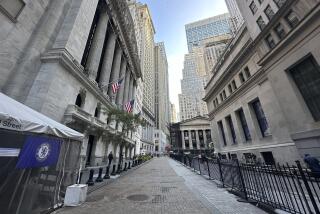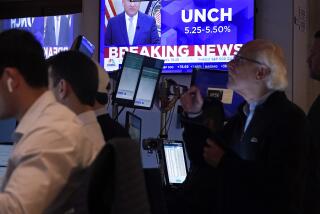TOP STORIES -- Aug. 8-13
- Share via
California Employers Cut a Net 17,300 Jobs
California’s employers went into a hiring funk in July, cutting a net 17,300 jobs and raising concerns that the state’s economic recovery has lost steam along with the nation’s.
The state’s first decline since February in seasonally adjusted nonfarm payrolls followed revised gains of 19,100 in June and 33,200 in May, the state Economic Development Department reported. The tumble came as the nation added only 32,000 net jobs in July, far below expectations.
On the bright side, California’s unemployment rate fell to 6.1% in July, down from a revised 6.3% in June.
The Golden State’s economy has been jolted by some of the same factors strafing the nation, economists said. Higher gasoline prices have stifled consumer spending. President Bush’s tax cuts have lost some of their stimulative effect. Employers have been cautious about hiring.
However, many economists continue to express confidence that the midsummer slump is temporary.
*
Optimistic Fed Raises Key Interest Rate
The Federal Reserve raised interest rates again despite recent signs of economic weakness and declared that more tightening was needed to keep inflationary pressure contained.
The central bank’s policymaking committee increased its benchmark federal funds rate on overnight loans between banks to 1.5% from 1.25%.
Fed officials acknowledged that economic growth and job creation had slowed in recent months. But they blamed the softness largely on oil prices and said the economy “appears poised to resume a stronger pace of expansion going forward.”
Noting that inflation had been “somewhat elevated,” they said they intended to continue on a path of “measured” interest rate increases to prevent prices from spiraling upward.
That statement damped recent speculation that economic sluggishness might prompt the Fed to refrain from increasing rates at its next meeting Sept. 21 or even for the rest of this year.
*
News Corp. Profit Up 7.8% on TV Ad Sales
News Corp. said fiscal fourth-quarter profit rose 7.8%, boosted by stronger advertising sales at its TV networks and stations.
Net income was $399 million for the three months ended June 30, up from $370 million a year earlier. Revenue rose 20% to $5.52 billion.
News Corp. earned 29 cents per American depositary receipt, compared with 24 cents last year, exceeding Wall Street’s expectations by a penny.
Revenue beat some projections by more than $500 million.
News Corp. executives said the company’s operating profit should show gains in the “mid-to-high teens” for the fiscal year that began in July. For the just-ended fiscal year, operating profit was $3.1 billion.
Also, News Corp.’s board decided to move the company’s place of incorporation to the U.S. from Australia, making the New York Stock Exchange the main market for common shares.
*
HP Shakes Up Unit as Profit Misses Forecast
Hewlett-Packard Co. surprised Wall Street by revealing that profit for its fiscal third quarter fell far short of expectations, and the computer maker ousted a trio of top managers.
Chief Executive Carly Fiorina said the problem stemmed from “unacceptable execution” in its enterprise division.
Earnings nearly doubled to $586 million, or 19 cents a share, in the quarter ended July 31, from $297 million, or 10 cents, a year earlier. Revenue rose 9.2% to $18.9 billion. But operating profit of 24 cents a share missed analysts’ estimate of 31 cents.
In an e-mail to employees, Fiorina said Peter Blackmore, head of the group that sells enterprise products, was leaving the company. Jim Milton and Kasper Rorsted, senior vice presidents in the same group, also are leaving, Fiorina said.
Meanwhile, Dell Inc. said its second-quarter profit rose 29%, partly because of steadily increasing demand for its server computer and storage products, to $799 million, or 31 cents a share, from $621 million, or 24 cents, a year earlier. Revenue grew 19% to $11.7 billion.
*
U.S. Loses Ruling in Challenge by S&L;
The U.S. government lost a round in a long-running battle over whether it must pay damages to certain savings and loans that lost billions of dollars after Congress abruptly changed S&L; accounting rules in 1989.
The U.S. Court of Appeals for the Federal Circuit in Washington upheld $381 million in “wounded bank” damages to Glendale Federal Savings, a former Southern California thrift that now is part of Citigroup Inc.
Dozens of thrifts are still battling the government over billions of dollars they lost when Congress reversed the balance-sheet gimmick in 1989 as part of a massive bailout of the industry.
The government took GlenFed and two other thrifts to the U.S. Supreme Court in 1996, unsuccessfully arguing that it had no liability for the losses; since then the battles have been over the size of the damages.
The government is likely to appeal the GlenFed case to the full Federal Circuit appeals court.
*
Genentech Warns of Clot Risk With Avastin
Genentech Inc.’s colon cancer drug Avastin can increase the risk of blood clots, heart attacks and strokes, the company and the Food and Drug Administration said.
Avastin went on sale in February, becoming the first drug to treat tumors by shrinking the blood vessels that feed them.
Genentech said in a letter to doctors that colon cancer patients who took Avastin with chemotherapy had double the risk of arterial blood clots than patients on chemotherapy alone. Clots in the arteries can cause heart attacks or strokes.
Up to 5% of patients on Avastin in clinical trials developed clots, Genentech said in its letter. Patients over 65 with a history of blood clots face added risk, Genentech warned.
The warning was unlikely to slow Avastin sales, doctors and analysts said. They said many of the patients who use the intravenous drug are seriously ill and have few other treatment options.
*
Shell Oil Postpones Shutdown of Refinery
Shell Oil Co. is postponing the Oct. 1 shutdown of its Bakersfield refinery to allow more time for talks with potential buyers.
The move came as part of an agreement between Shell and state Atty. Gen. Bill Lockyer, who has been pressuring Shell to keep the plant open or find a buyer for it.
The company said it would postpone closure of the refinery by six months.
Pushing the shutdown date back is a reprieve of sorts for California motorists because it will extend the life of a facility that makes 2% of the state’s gasoline and 6% of its diesel.
It is especially important for farmers in the San Joaquin Valley, who rely on diesel from the refinery to power tractors and other equipment.
Shell’s plan to shutter the Bakersfield facility caused a backlash among legislators and others who said the closure would further increase California’s fuel prices.
*
Theme Parks, ESPN Boost Disney Profit
Propelled by its theme parks and cable channel ESPN, Walt Disney Co. posted a 20% gain in fiscal third-quarter profit.
The Burbank entertainment giant said it earned $604 million, or 29 cents a share, in the three months ended June 30. That’s up from $502 million, or 24 cents a share, a year earlier. Revenue rose 17% to $7.47 billion.
The results beat analysts’ estimate of 27 cents a share.
The company’s improved performance continues to give Chief Executive Michael Eisner, who spent the first part of the year fending off calls for his resignation after nearly 20 years at the helm, more breathing room.
Profit at the theme park unit climbed 20% to $421 million. And the company’s cable networks, particularly ESPN, provided gains in its TV divisions. But operating profit at Disney’s movie studio division fell to $28 million from $71 million.
Executives said the theme-park rebound after the terrorist attacks suggested that they were beginning to see returns on some of their investments.
*
L.A. Hotels, Union Plan to Resume Talks
Nine upscale Los Angeles hotels came to the brink of locking out union workers after a wildcat strike but then agreed to return to the bargaining table. Talks will resume Monday with the top federal mediator and the national president of the hotel workers union, the hotels said.
The turn of events was the latest in a protracted contract battle between the ambitious union and a powerful group of national hotel chains.
Hotel managers at one point agreed to lock out their 2,900 union workers after housekeepers, cooks and banquet servers staged a one-day strike at the Westin Century Plaza in a dispute over medical insurance. But hours later, both sides agreed to return to the bargaining table with Peter J. Hurtgen, director of the Federal Mediation and Conciliation Service.
*
From Times Staff
*
For a preview of this week’s business news, please see Monday’s Business section.
More to Read
Inside the business of entertainment
The Wide Shot brings you news, analysis and insights on everything from streaming wars to production — and what it all means for the future.
You may occasionally receive promotional content from the Los Angeles Times.










